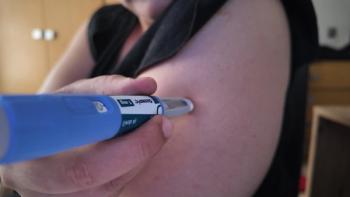
A New Care Delivery Model May Positively Impact Care Referrals for Patients with Breast Cancer
Early research showed an improvement in provider recommendations of care for patients with breast cancer based on eight guideline metrics.
Early results showed that a new care delivery model improved breast cancer care, according to a poster presentation at this year’s Oncology Nursing Society (ONS) Annual Congress.
The 4R Care Sequence® is a one-page, multimodality, personalized care project plan that is used by the care team to plan and deliver care. The 4 Rs in the title represent the right information, care, patient and time. It incorporates recommendations for patient-centric care pathway plans from the Institute of Medicine, Medicare’s OCM and NCCN guidelines, which include multi-modality planning from diagnosis to survivorship that specifies the clinical team, identification of therapy and side-effects and supportive care.
“The 4R model provides a roadmap for the patient and also for the patient’s care team,” said Janeen Bazan, RN, OCN, BSN, lead author of the poster and an oncology nurse navigator from Advocate Sherman Hospital, during the presentation. “It’s very helpful in time management for the patient.”
To understand how the 4R Care Sequence® plans impacted care, researchers surveyed 77 patients with stage 0-3 breast cancer from September 2019 to August 2020 at Advocate Sherman Hospital. Of the patients, 28 received 4R Care Sequences® and 49 received a baseline control model.
A survey given to all patients asked whether or not the patients’ care provider instructed them to do certain activities. The researchers found that all patients who received the 4R Care Sequences® were more likely to have been counseled in 8 areas:
- Getting an immunization (flu, pneumonia, shingles) before starting cancer treatment (52% of baseline cohort, 70% of 4R cohort)
- Seeing a dentist before starting cancer treatment (13% of baseline cohort, 33% of 4R cohort)
- Getting a genetic counseling appointment before surgical decision (39% of baseline cohort, 44% of 4R cohort)
- Managing weight if over or under weight (16% of baseline cohort, 26% of 4R cohort)
- Getting a nutritionist consult about how to eat during cancer treatment (15% of baseline cohort, 26% of 4R cohort)
- Getting emotional support (46% of baseline cohort, 52% of 4R cohort)
- Keeping up appointments with primary care for routine care (67% of baseline cohort, 75% of 4R cohort)
- Caring for a chronic disease (43% of baseline cohort, 46% of 4R cohort)
Early results showed that the use of the 4R Care Sequences® improved the referrals of recommended breast cancer care. Due to the small sample size, Bazan reported that the results are not statistically significant, however, the trend is still encouraging. The researchers’ plan to continue using 4R Care Sequences, collecting patient surveys and assessing their impact.
“I’m very excited to look at our next data and share with other programs, and hopefully bring in other cancer types,” Bazan said.
Reference:
Bazan J. Early results: Impact of 4R (Right Info / Care / Patient / Time) care sequence plans, provided to patients by oncology nurses, on timing and sequence of guideline recommended care. Presented at: Oncology Nursing Society 46th Annual Congress; April 20, 22, 27, and 29, 2021. ePoster 1567.
Newsletter
Knowledge is power. Don’t miss the most recent breakthroughs in cancer care.


































